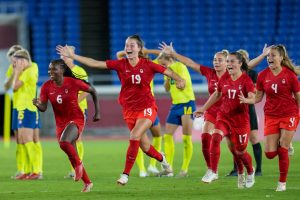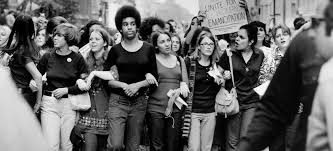1
Section One: The Fundamentals
A) What do we know about sport? What are common assumptions we make about sport and society?
- Sport builds character.
- Sport provides opportunities for social mobility.
- Sport encourages teamwork and unity.
- Sport reflects values and social norms.
- Sport transcends politics.
- Sport speaks a universal language.
- Sport is a measure of individual merit.
|
While this can be true for some, I don’t believe it to be true for all. The reason for this is sport does not typically provide social mobility without some sort of compensation. While there is the exception of very talented athletes that get full ride scholarships, and paid expenses for travelling, this is not necessarily common. Often, parents — or even the child themselves depending on the families financial situation — must pay fees in order to climb higher within their sport. This includes things such as flights and accommodations for away games which is very common as you get older and advance within your league. Therefore, many minorities are not accorded social mobility because they are not always able to provide the starting fees, or the extra expenses that come with the sport. Therefore, while sports can ultimately provide social mobility, it comes with strings attached that impedes multiple minority groups from moving up the ladder, and rather provides middle to upper class white individuals to move. |
Exercise 3: Notebook prompt
What are some other metanarratives about sport that you are familiar with? Find an image or video clip or draw something yourself that captures this idea…
Team Canada Women’s Soccer Triumphant Win Against Sweden

So what? Why does any of this matter? Does it matter? As something we grow up with – live with – play through – we don’t often interrogate the meanings of sport, and perhaps we don’t want to.
But being aware of these assumptions and metanarratives is especially important, I would argue, because of the centrality of sport to our everyday lives, the role that sport plays in shaping our childhood and worldviews and….. [finish that thought]
| the unique experiences individuals face. While metanarratives are considered to be all encompassing truth, this is not always the case for all people. An example of this is that it is believed that sport provides a supportive environment and promotes growth and social mobility. While this can be true for some, it is not the case for all. Minorities tend to not have this advantage compared to their white counterpart due to systematic racism. Moreover, children and teens participating in sports in low-income neighbourhoods also do not have this expected “luxury”. Furthermore, another common metanarrative regarding sport is its expression of unity and camaraderie. Unfortunately while we’d like to believe that this is the case for all players, it is not. Sexism, racism and homophobia have inflicted itself into the locker-rooms and have created discourse between players. Most recently, many Russian NHL players such as, Ilya Lyubushkin and Andrei Kuzmenko, refused to wear rainbow jersey’s in honour of pride because it went against their religion and beliefs. This caused backlash against some fans, while it incited a chant of agreement from the other side. This caused Garry Bettman to ban rainbow tape, and rainbow jersey’s during warm-ups. However one NHL player, Travis Dermott, a cis-gendered straight man disobeyed this ban, and put rainbow tape on his blade during warm-up. This caused a lot of backlash from fans, teammates, and Bettman himself, but ultimately teh ban was rescinded. This did not show unity between team members, but rather discord. Therefore, it is especially important to be aware of what is a sport metanarratives and not an overarching truth. |
B) What is social justice?
Exercise 4: Padlet Prompt
Think back to the last section and try to look at some of the ideas we discussed differently. How might sport and social justice actually co-exist?
Record any images, video clips, or gifs you added to the padlet and identify a point of intersection between sport and social justice (can be an issue or a barrier or a debate or something you would like to explore in more depth in this course) . Screenshot or paste in your response below.

|
When I think of activism within sports, I am immediately met with this image of Colin Kaepernick kneeling for the national anthem starting in 2016. The reasoning behind him kneeling was to protest police brutality against people of colour, especially Black individuals. He used his higher status in society for good to protest the systemic racism in the United States, and unfortunately did not receive the proper treatment. I believe this to be a great example of an intersection between sport and social justice because of the backlash he was faced with. Instead of applauding his activism, the NFL began blackballing him, forcing him to retire because he was not getting picked up. There is an element of systemic racism within professional sport that Kaepernick revealed, and used his story for good to advocate for young African American kids in sport with things such as his Netflix limited series. His story changed the narrative around activism within professional sports, such as football. |
C) Social Justice Reading
D) KINESIOLOGY AND SOCIAL JUSTICE
Exercise 5:
- Social justice is a difficult concept to identify because of its … conflation with other concerns like multicultural education, critical pedagogy, postmodernism, post colonialism, and queer theory
- How does mainstream discourse construct marginalized populations as “being-at-risk” for health and fitness issues? … It suggests they lack the capacity for self-discipline.
- Fill the missing words … deficient, fixed, goals
- Drag the words into the correct boxes … According to the authors of this article, by making health and fitness a matter of personal responsibility, individual choice, and moralized practices, healthism obscures
and glosses over issues of privilege, discrimination, and social inequalities.
Exercise 6:
What are the implications of bodies-at-risk discourse and the refusal to understand the health gap from a social justice perspective, according to the authors of this article?
| What the authors argue regarding bodies-at-risk, is how this once again makes whiteness, and able-bodied the norm, and fails to account for racialized bodies as well as disabled folks. Because there are a certain set of standards that would qualify for your body to be “at-risk”, there are equally ideals put in place. However, who decides what those ideals are? Most often then not, it is done by medical professionals who have been taught western practices that does not account for differing bodies. Therefore, with the bodies-at-risk discourse, often white individuals are not considered to be “at-risk” because their body was the original framework, while marginalized folks are more likely to be considered to have an at-risk body. This then also commodifies racialized, and disabled bodies by offering fad diets, fitness plans, and such, so that their body can fit into the societal expectation of health, which equates to white bodies. |
Section Two: Sport Feminism
Exercise 7: Notebook Prompt
What is feminism? What does it mean to you? Choose one of the images below and explain how it captures your understanding of feminism (or find one that does speak to you and paste this into your pressbook with an explanation of why it matters to you.

| Out of the six photos provided, I found this one to represent feminism the most. My reason behind this is simple, and that is because of its portrayal of intersectionality. This picture shows a group of people marching together, uniting in the name of emancipation, which represents the day that the Abolition of Slavery Act was enacted. This freed all Black individuals forced into slavery, and it especially freed Black women. While feminism began with the suffragettes, a group of white women protesting for the right to vote, my understanding of feminism does not simply include white upper-middle class women. Feminism to me includes all women. This includes women of colour, poor women, trans-women, cis-gendered women, as well as everyone who identifies as a woman. Personally, I do not think men belong in the discourse of feminism. While they can be ally’s and advocates for women, they cannot understand the oppression women have, and continue, to face. That is why I find this picture to be a great example of what feminism means. While emancipation celebrates the freedom of Black people, women of all cultural background, and all ethnicity are linking arms, and walking in solidarity. They are holding each other up regardless of their differences, and are fighting for the same cause: equal rights |
Exercise 9: Crossword Activity
Across:
5. Heterosexy
9. Underrepresentation
10. Capitalism
13. Invisibility
Down:
1. Reform
2. Malestream
3. Essentialism
4. Serena
6. Socialization
7. Relativism
8. Performativity
11. Fluidity
12. Rich
Exercise 10: Padlet Prompt

| Feminism, Liberal, Radical, Marxist, Socialist, Black Feminism, Post colonialism, Poststructuralism, Queer Theory, Performance, Women, Inequalities, Patriarchy, Opportunity |

